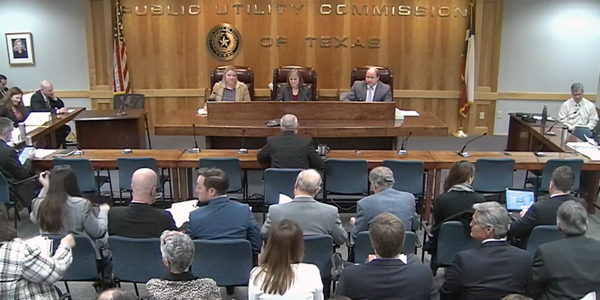Lubbock Power & Light told Texas regulators last week that it continues to hammer out settlement agreements that will resolve most of the arguments in the utility’s proposed migration of 470 MW of load from SPP to ERCOT.
Chris Brewster, legal counsel for LP&L, told the Public Utility Commission on Jan. 25 that the utility has modified a settlement agreement reached Jan. 17 with PUC staff and several consumer groups. (See Texas Regulators Noncommittal After LP&L Hearings.)
He also said the utility has reached a separate agreement in principle on the SPP side that involves an upfront payment from LP&L to SPP and Southwestern Public Service, which serves Lubbock’s load under a pair of long-term contracts. Brewster did not disclose monetary figures or further details in the agreement, which had not been filed with the PUC as of Friday afternoon.
The Texas parties agreed the only outstanding issue in the proceeding (Docket 47576) pertains to who will build the $360 million in infrastructure ERCOT has projected would be needed to connect LP&L’s load with its system.
“The discussions are ongoing,” Brewster told the PUC. “The parties in West Texas have a perspective on that.”
The commissioners discussed whether to carve out the transmission construction issue separately, but they decided to allow Brewster a chance to include it in the settlement agreements. Brewster will update the PUC at its next open meeting on Feb. 15.
PUC Opens Rulemaking on Distributed Battery Storage
The commission voted to dismiss an AEP Texas request to connect battery storage facilities to the ERCOT grid (Docket 46368), instead opening a rulemaking to “develop a framework within which [it] can consider a broader range of technologies and study the potential impacts to the competitive retail market and energy-only wholesale market in ERCOT.”
Chair DeAnn Walker said in a memo that AEP’s proposal included issues that need “additional commission review and information,” and suggested the PUC “take a wider view of the innovative concepts raised in this docket as well as other potential technological solutions.”
An administrative law judge had approved AEP’s proposal to connect a pair of utility-scale lithium-ion battery facilities to the ERCOT system in West Texas, but the company ran into broad industry opposition when the ALJ ordered the facilities to be classified as distribution assets and included in AEP’s cost-of-service rates. (See PUCT Considering Rulemaking over AEP Battery Proposal.)
In her memo, Walker said she “firmly” believed the energy consumed by the batteries should not be treated as unaccounted for — or unmetered — energy, as AEP proposed.
“The rulemaking should address a method by which any energy necessary for the implementation of a solution can be measured and accounted for within the market,” she said.
Walker also suggested amending PUC rules to require a utility to obtain a certificate of convenience and necessity to use “non-traditional technologies to solve distribution problems.”
“We’re excited about seeing this technology get into our market,” said Commissioner Brandy Marty Marquez. “Batteries are the commonsensical response to the renewables we’ll see in our market.”
Commissioner Arthur D’Andrea said he had concerns about allowing “regulated utilities to play in this space.”
“The energy does overhang the market,” he said.
Commission Issues Favorable Entergy Orders
In a pair of actions related to Entergy Texas, the PUC signed off on a report analyzing the costs and benefits of MISO membership and approved the company’s request to build a 230-kV transmission line in southeast Texas.
The commission requested the report when it approved the transfer of operational control of Entergy’s assets to MISO in October 2012. The PUC declined Texas Industrial Energy Consumers’ proposal to impose reporting requirements on Entergy, agreeing with staff that it already can request information from the utility as it deems necessary.
— Tom Kleckner






